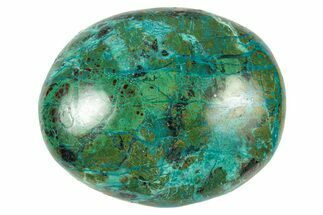This Specimen has been sold.
1.1" Natural, Native Copper Formation - Peru
This is a natural formation of native copper that comes from Peru. There are several mines throughout Peru that produce native copper, making it difficult to provide a specific locale for this specimen.
Native copper is an uncombined form of copper that occurs as a natural mineral. Copper is one of the few metallic elements to occur in native form, although it most commonly occurs in oxidized states and mixed with other elements. Native copper was an important ore of copper in historic times and was used by prehistoric peoples.
Native copper occurs rarely as isometric cubic and octahedral crystals, but more typically as irregular masses and fracture fillings. It has a reddish, orangish, and/or brownish color on fresh surfaces, but typically is weathered and coated with a green tarnish of copper carbonate.
The mines of the Keweenaw Peninsula in Upper Michigan were major copper producers in the 19th and early 20th centuries, and are still the largest deposits of native copper in the world. Native Americans mined copper on a small scale at this and several other locations, and evidence exists of copper trading routes throughout North America among native peoples, proven by isotopic analysis. The first commercial mines in the Keweenaw Peninsula (which is nicknamed the "Copper Country" and "Copper Island") opened in the 1840s.
Native copper occurs rarely as isometric cubic and octahedral crystals, but more typically as irregular masses and fracture fillings. It has a reddish, orangish, and/or brownish color on fresh surfaces, but typically is weathered and coated with a green tarnish of copper carbonate.
The mines of the Keweenaw Peninsula in Upper Michigan were major copper producers in the 19th and early 20th centuries, and are still the largest deposits of native copper in the world. Native Americans mined copper on a small scale at this and several other locations, and evidence exists of copper trading routes throughout North America among native peoples, proven by isotopic analysis. The first commercial mines in the Keweenaw Peninsula (which is nicknamed the "Copper Country" and "Copper Island") opened in the 1840s.
 Reviews
Reviews












